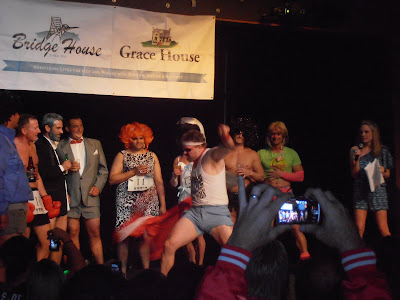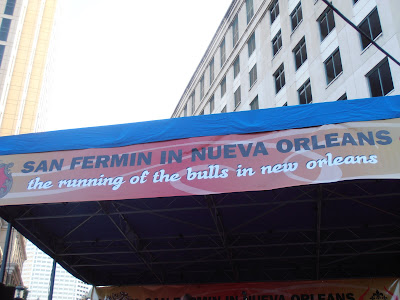Marriage - noun the act or an instance of blending or joining, especially opposite or contrasting elements (dictionary.com)
It was another hot summer Saturday in New Orleans and Catie and I were trying to stay cool in the heart of New Orleans' tourism hub, Jackson Square. We drank cocktails at the corner bar and waited for the church clock to strike three. The Square was filled with the usual clout, tourists and artists, fortune tellers, white tubas and gold trombones, homeless men and women, everyone sharing the bond of sweat on a hot Saturday afternoon, trying to make a dollar off the other. The city lives off tourists. Less than half a million people live in the city, but more than eight million people visited it last year to spend their money and spin their cameras. The city depends on them, and as much as a local might try to avoid walking the same streets, it is inevitable that our paths cross and that we sometimes walk the same line, sometimes in the same spirit, trying to get the best of a given night downtown.
But I wasn’t in the French Quarter to visit. Catie and I had better plans. When the limousine pulled into the square, I finished my bloody mary, put my jacket over my shoulder, and waded through a crowd of men and women wearing cameras around their necks. The sun was hot and the skies were clear and the day had the special air of shared festivities, the kind of afternoon that everyone enjoys the same, no matter where you're from. We entered the religious gem of downtown New Orleans, into a place I had only visited before with a camera and shorts, like a tourist—the St. Louis Cathedral. It was a great day for a big-ass wedding.
“Let us proclaim the mystery of faith!” The priest rang out. I readied myself for some spiritual answers, but it was a Catholic service, and by the end I felt good and confused and particularly guiltless in that clean sort of way that seculars feel when reminded of why they aren’t more religious. The hall itself was grand, the ceiling clean and celestial, and the wedding beautiful in the way that all weddings are beautiful, the formal intersection of two unlikely souls coming together for something longer than a moment. Men wore white linen suits and a few hundred guests took communion while the rest of us waited, thinking of opens bars ahead. After two hours, the organ played the exit music, and we all filed out into the sun.
A five piece band waited for us and began to play. Tourists gathered. They were confused. They thought the event was for them, a show, something that happens at fifteen minutes past the hour and costs a dollar in a bucket. They mixed themselves in with the guests and took pictures. We all danced together, the in and out of towners, the tourists with bad baseball caps and cameras and the wedding guests in linen waving white handkerchiefs and scarves. Everyone danced until the bride and groom came out and then we began to parade. The tourists, now realizing that this was not for them, parted and stood on the sidewalk as we filed past them. A man in a fanny pack turned to his wife, shook his head and said, “Only in New Orleans.” Then he snapped a picture.
We all followed the music through the Square and across Decatur Street, forming a thin but deep procession until we could no longer see the band and its horns but could hear it leading us to the river.
At the banks of the Mississippi the band put away their horns and the Natchez Steamboat blew its copper whistle to welcome us. The river has a long celebrated history of steamboats, and New Orleans has long been a home of riverboat gambling and races organized to test the superiority of newer models against older. The Natchez is the ninth of its namesake, the first being built in 1823 in NYC but operated in New Orleans. It is said that the current Natchez has never lost a race on the river, but it’s been years since it competed. Now it is a daily host to evening cruises of dinner and dancing. But it was owned by the groom’s family and so for the night the boat was ours.
It was raining and cloudy and most people stayed inside, but I sat on the deck and drank scotch and talked with those willing to get wet. The older guests weren't visitors or out-of-towners, but longtime residents. It is merit enough to have lived here since before the storm, but it is a rarity to meet true natives, folks born and raised in the Crescent City who didn't leave after Katrina. I talked with an older lady who always held a cigarette in her hand, permanently smoking or ashing or drinking or talking, and she declared her roots with an untouchable pride, knowing her badge of honor was rare and exclusive. We talked about schools.
“What do you here?” she asked.
“I teach.”
“Where?”
“Here.”
“In the city?”
“Yes.”
“Good for you.” She dragged from her cigarette.
“Why is that?”
“New Orleans kids are rough.”
“I’ve taught in tough schools before, Boston and Pittsburgh. It’s similar down here.”
She leaned forward. Her cigarette still smoking. “Black people aren’t the same here as they are up North.” She leaned back and finished smoking. I left for more scotch and to watch the great wheel turn as the boat blew its whistle. We left the dock heading south then west on the great Mississippi River.
Old and new factories perched on the river banks like a timeline, a history of abandonment and resurgence, abandonment and resurgence. Houses, factories, buildings--artifacts of an earlier culture and tradition--when old and unused are not torn down or removed, but neglected and left alone until they are so colorless and vapid that they stand out as much as everything new and modern around them. It is never understood, not to me, whether they remain up because there isn't the collective energy and resources to take them down, or in the hopes that they may one day be revived. Nothing expresses this dynamic better than the Mississippi and the industrial contrasts that adorn its always-changing banklines. I drank beer and took pictures under the light rain. When I was feeling tight enough, I went inside for roast beef and bad pop music.
The sun went down quietly and when the steamboat returned to the French Quarter it was night time. We drank a last round, exited the boat, ready for a rare night out in the French Quarter, a place we rarely visit in the evenings because of its saturation of tourists and faux-authentic establishments. A young man from the wedding, William, swiped a few wine bottles from the bar and joined us. He emptied pulled out plastic cups and filled them up and led us across Jackson Square, around St. Louis Cathedral, and into an Absinthe bar where a lady with a pirate hat served us. It was busy with visitors, families strolling by on ghost tours, a middle-aged couple from Denver who showed us pictures of the wedding we had been in earlier, and a small bachelorette party completing some kind of internet treasure hunt checklist.
I wanted to flirt, but I was shy. William, who was gay and unafraid of women, gathered them and filled their cups with wine.
"Why are you dressed up?" one of them asked. Her name was Joy.
"For a wedding earlier." I said.
"The one with the parade?"
I nodded.
"You were in it?"
"Yep."
Joy looked at her checklist.
"It says here I need a kiss from a local." I didn't tell her that in New Orleans, you aren't really a local unless you were here before the storm. For tourists, spending time with any kind of resident is credible enough to authenticate the experience, so when she put her cheek out, I kissed it.
The wine was gone and William was thirsty and restless. We followed him through the Quarter, our party now complete with bachelorettes, a Denver couple, and other tag-alongs who seemed to sense some excitement in our group. We stopped at the Goldmine Saloon, a black hole of a club, and drank flat beers and danced on the floor even though it was empty. The floor was dirty and there was broken glass piled in the corner. I danced with the bachelorettes and thanked whatever fates divine over French Quarter nights for delivering such a blessing from out of town. The more I drank, the less local I felt. I was reduced to base desires and depravity, intermingling with out-of-towners, trying to pose as a local guide of good times, all while wearing my finest clothes. The only place to go now was Bourbon Street, the electric cesspool of fine dining, piss and liquor, a street designed to simultaneously entertain and contain the millions that come to the city with the intention of pushing the limits of bad habits in a way you can't anywhere else in America. After midnight, the bright lights, the strippers in doorways, the women carrying two foot-tall cocktails, the large wooden crosses of religious men shouting about doom and sin through mega-speakers, all appear blurry, whether you have been drinking or not. The streets smell like urine and all the tourists' lips are cherry red from drinking too many daiquiris. I fumbled along, following William, leading a pack of tourists, my own local identity dissipating in a cloud of beer and desire, until I realized I was just another stumbling out-of-towner on Bourbon. Joy followed beside me. She still had the checklist in her hand, still crossing things off as she walked. Still determined to win the hunt. We found another loud bar one block off Bourbon.
When we tried to enter the bride-to-be could not find her wallet. She had left it in the black hole. I offered to walk them back but before I knew it they had waved down a cab in the direction of Bourbon and were gone. The fates had robbed me. I sat at the bar and sulked in my drink. The wife from Denver sat next to me and told me her life story. The bar was loud and I couldn't hear her. After half an hour, I turned to her and said, "I'll be honest, I haven't heard a thing you have said."
"Oh, I am sorry. Sometimes I speak too low." She started her story again, in the same inaudible whisper. I closed my tab and left.
On the corner I ran into the devil. He was down and out and wanted a dollar. He had kids at home, he said. I pulled my camera from my pocket. I took his picture and gave him my last dollar.
“How are you tonight?” he asked.
“I’m tired.”
“There’s a lot of good drunk women on Bourbon tonight.”
I nodded. It was late and I could seem them down the street, stumbling under the electric lights of piano bars and daiquiri shops, not yet giving up their night even though they couldn't walk straight, ripe with short memories and moral hangovers. My tie was stained with wine and sweat. I straightened it, said goodnight to the devil and flagged down a taxi headed in the other direction.


























































